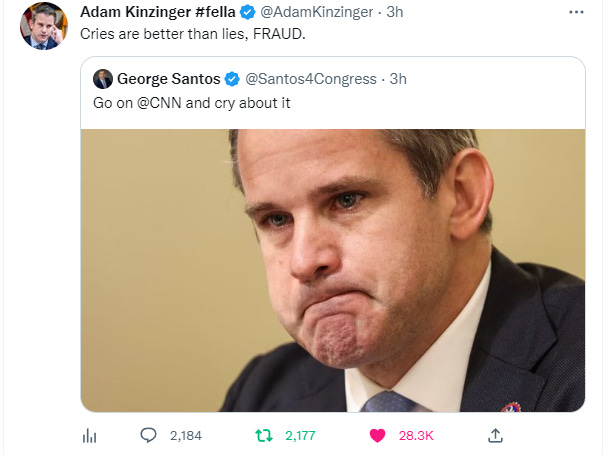Heads up: On today’s Bulwark podcast I have a lively conversation with a newly liberated Adam Kinzinger, who is just beginning to detox from his years in Congress. What was it like watching last week’s snow globe of guano? Will the GOP normies ever stand up? How damaging are new Biden docs?
He also offers his after-action thoughts on the work of the January 6th Committee. Stay tuned … it will be posted this afternoon. Please consider subscribing.
How about a palate cleanser to start your day? The scene:
Dave Todeschini, a YouTuber and self-proclaimed QAnon “decoder,” told Andrew Callaghan of the documentary This Place Rules that he thinks “Nancy Pelosi and those people” were the ones behind the Jan. 6 Capitol riot.
“They had Antifa go in dressed as MAGA people,” he said, adding that Trump is going after pedophiles in government, so in turn. they’re going after Trump — who is “about as far from a paedophile as you’re gonna get.”
He then started holding up images of people like Oprah Winfrey and Hillary Clinton, which he described as “pedophiles,” as well as President Joe Biden. “Oh yeah. I call him creepy sleepy chomo Uncle Joe,” Todeschini said, explaining that “chomo” is a prison term for “child molester.”
This is when things take a turn. The interviewer tells Todeschini that he “needs to talk” to him about something.
“On May 19, 1999, you were convicted of sexual abuse in the first degree and sodomy in the second degree of an eight-year-old boy in New Jersey,” Callaghan says. “So, according to this paper, you are a registered sex offender and a convicted pedophile.”
Oh.
Todeschini claimed the conviction was “false.”
“You want to take a look at this [paper]?” Callaghan asks Todeschini.
“I know, I’ve seen the paper. I pled because I knew – I did what Michael Flynn did. I knew I couldn’t win,” Todeschini replied.
And the kicker. Callaghan asks him: “Have you ever heard the term ‘projection’ before?”
If your cup has not yet runneth over, you can watch this video here:
BONUS: “Alex Jones Phone Dump Reveals Text Convos With Tucker Carlson.”
Happy Thursday.
The Santos Meltdown
New York Republicans have seen enough.
WESTBURY, N.Y. — Republican officials on Long Island, including Representative Anthony D’Esposito, called on Wednesday for Representative George Santos to resign, as he faces multiple inquiries into his finances, campaign spending and fabrications on the campaign trail….
Mr. D’Esposito, who joined the event via video from his office in Washington, said he “will not associate with him in Congress and I will encourage other representatives in the House of Representatives to join me in rejecting him.”
The Nassau County party chairman, Joseph G. Cairo Jr., said that Mr. Santos, a first-term Republican, had lost the confidence of Republicans in his district, saying that Mr. Santos’s campaign was one of “deceit, lies, fabrication.”
“He’s disgraced the House of Representatives, and we do not consider him one of our congresspeople,” Mr. Cairo said. “Today, on behalf of the Nassau County Republican Committee, I am calling for his immediate resignation.”
**
Santos insists he’s not resigning, but the former Nobel Laureate, Super Bowl MVP, and Cy Young winner is probably lying about that too. Meanwhile My Kevin is being Kevin: Via ABC:
McCarthy later said that Santos would serve on some other committees and declined to join the calls for Santos' resignation.
"The voters made the decision, and he has a right to serve here," McCarthy told Rachel Scott. "If there is something that rises to the occasion that he did something wrong, then we'll deal with that at that time."…
"Is there a charge against him? You know, in America today, you're innocent until proven guilty," McCarthy said when asked if he would take any action against Santos.
Exit: As I said on Deadline: White House yesterday: Maybe this is what happens when you build a cult around a lying sociopath. And stack the party with lying sociopaths.
But for Kevin’s GOP, this less about morality than math. If Republicans had a 40 vote margin, Santos might be toast. But with a four-vote margin, Republicans need Santos; and a special election would likely flip the district back to D. So Santos will continue to be Kevin’s dead fish: growing ever more rank and noxious while Kevin & Co. pretend they don’t smell anything.
**
Meanwhile, via Punchbowl, Senate Republicans are getting worried about their reckless compatriots in the lower house.
Senate Republicans are already fretting about this year’s deadlines for must-pass legislation such as government funding and raising the debt ceiling — and they’re much less sanguine about the prospects for a grand bargain on immigration and the border….
Hardline conservatives in the House have the potential — and, under McCarthy’s speakership, the ability — to grind the federal government to a halt if they don’t get their way. And that’s concerning to the Senate’s conservative dealmakers.
“There probably are going to be some serious challenges to getting the numbers right” on must-pass legislation, Sen. Thom Tillis (R-N.C.) said in an interview at the southwest border. “Some of these things are not like, ‘Well, we disagree, we’ll come back and do it next year.’ These are date-certain sorts of challenges that we’re going to have to look to the House to figure out how they bring together a coalition.”
And, perhaps inspired by last week’s shambolic show in the House, Senator Rick Scott is out with this circular firing squad video:

**
Speaking of Republicans in disarray, I had the pleasure of joining Kara Swisher and CNN’s Manu Raju on this week’s edition of “On.” Give it a listen…
The dust from last week’s once-in-a-century, marathon voting session in the House has settled, and Kevin McCarthy is finally Speaker of the House — for now. But what’s next? We talk to Manu Raju, CNN’s Chief Congressional Correspondent, and Charlie Sykes, a former conservative talk radio host and a founder of The Bulwark, to make sense of it all.
They run through some of the colorful personalities in the House Republican Conference, unpack how the Republican Party unraveled and discuss the opportunity for the Democrats to emerge as unified party. And, of course, they make predictions about Trump, Biden and more in 2024.
Political Orphans
ICYMI: Bret Stephens and David Brooks had an interesting conversation about what happened to the GOP, and what was once the “conservative movement.”
Bret Stephens: Lately I’ve been thinking about that classic Will Rogers line: “I am not a member of any organized political party. I am a Democrat.” A century or so later, it looks like the shoe is on the other foot. Is it even possible to call the Republican Party a “party” anymore?
David Brooks: My thinking about the G.O.P. goes back to a brunch I had with Laura Ingraham and Dinesh D’Souza in the ’80s that helps me see, in retrospect, that people in my circle were pro-conservative, while Ingraham and D’Souza and people in their circle were anti-left. We wanted to champion Edmund Burke and Adam Smith and a Reaganite foreign policy. They wanted to rock the establishment. That turned out to be a consequential difference because almost all the people in my circle back then — like David Frum and Robert Kagan — ended up, decades later, NeverTrumpers, and almost all the people in their circle became Trumpers or went bonkers.
Bret: Right, they weren’t conservatives. They were just illiberal.
David: Then in 1995 some friends and I created a magazine called The Weekly Standard. The goal was to help the G.O.P. become a mature governing party. Clearly we did an awesome job! I have a zillion thoughts about where the Republican Party went astray, but do you have a core theory?
Bret: I have multiple theories, but let me start with one: The mid-1990s was also the time that Newt Gingrich became speaker of the House and Fox News got started. Back then, those who were on the more intelligent end of the conservative spectrum thought a magazine such as The Weekly Standard, a channel such as Fox and a guy like Gingrich would be complementary: The Standard would provide innovative ideas for Republican leaders like Gingrich, and Fox would popularize those ideas for right-of-center voters. It didn’t work out as planned. The supposed popularizers turned into angry populists. And the populists turned on the intellectuals.
Bill’s in Berlin
Charlie,
A note from Berlin. As you know, I’m here for very interesting small, off-the-record meetings on Ukraine, put together by Jeff Gedmin, with leading German politicians government officials, several Ukrainians, and others. We’re at a hotel near where the Wall once divided the city. Which is a reminder that history can move slowly for a long time (e.g, 1961-1989), then very quickly.
You and I have often discussed how significant a moment this is in our own history, and Europe’s, and for that matter the world’s. And I just wanted to say that, part way through these discussions, I’m more convinced than ever we are at a major inflection point. And despite the terrible human cost, the example offered by Ukraine above all, but also the example of solidarity with Ukraine across much of Europe and in the U.S., means there’s a real chance for liberalism in the broad sense to seize the future from the autocrats.
It’s inspiring as well as interesting and of course challenging.
Will report more to you and everyone else when I’m back.Bill Kristol
Join Us!
Quick Hits
1. Don’t Call the Brazil Insurrection ‘Anti-Democratic’
The new threat isn’t fascists, writes Will Saletan in today’s Bulwark, it’s dupes who think they’re fighting for democracy.
It’s true that if the assault had succeeded in reinstalling Bolsonaro, it would have overturned Brazilian democracy. But it’s not true that the assailants understood themselves or their mission as anti-democratic. Most of them, subjectively, were pro-democratic. They believed that Bolsonaro had won the election, and therefore, they were defending democracy, not attacking it.
This isn’t just a cute semantic distinction. It’s crucial to averting, or at least defeating, a new kind of insurrection against legitimately elected governments in advanced countries.
2. Jim Jordan, Church Committee Pretender
In today’s Bulwark, Loch K. Johnson, Frederick Baron, and Dennis Aftergut write that Jordan’s new panel on the “weaponization of the federal government” bears no resemblance to the storied 1970s committee whose work led to intelligence reform.
Two of us (Johnson and Baron) served in key staff positions on the Church committee. The comparison is preposterous. The new House subcommittee is not remotely up to the Church committee standard—in origin, composition, or purpose.
To begin with, the Church committee bore serious moral authority, which arose from its truly bipartisan mission: tough-minded rethinking of intelligence agency activities under administrations of both parties stretching back almost twenty years.
3. Will the House GOP Really Walk the Plank for the Fair Tax?
From Jim Swift: In his desperation to win the speakership, Kevin McCarthy promised to put the gimmicky old idea up for a vote.
The Fair Tax Act would replace income, payroll, gift, corporate, and death taxes with a federal consumption (sales) tax. To ensure that the legislation actually replaces rather than adds to existing taxes, the bill includes a provision that the new tax would expire in seven years if the Sixteenth Amendment, which allows for federal income taxes, is not repealed. (Keen-eyed readers will notice that this creates the bizarre possibility of federal tax revenue going down to zero after seven years, if income taxes are not collected but the Sixteenth Amendment remains on the books.)











I have read Adam Smith's " The Wealth of Nations". It is a very large book. While centuries old it is still relevant. It refutes a lot of economic thinking that is today falsely called conservative. He was labeling the move from feudalism to market driven economics now called capitalism. What a lot not all of the donor class want is a move back to feudalism. A system where a few own everything and everyone else. Thanks but no thanks. If you actually read what Smith said, you know real capitalism is joined at the hip to a strong government and it's regulations. For trust for exchanges to happen you need the government to guarantee property rights and enforcements of agreements. You also need a currency that is stable which only a strong central bank can do. To keep markets open you need regulations and a government strong enough to enforce them. As Smith explain markets tend to monopiles . The seeds of destruction are inherited in capitalism. In my view the culture war is to distract the masses while the system is gigger more and more to feudalism.
“Innocent until proven guilty” is such a cheap, cynical deflection.
Of course that’s the case in a court of law.
Applied to politics, it implies that only convictions can be used to judge someone’s character and fitness for office (i.e. by a voter), or to hold an elected official accountable for misbehavior.
Trumpist Corollary - anything short of a criminal conviction is “exoneration”.